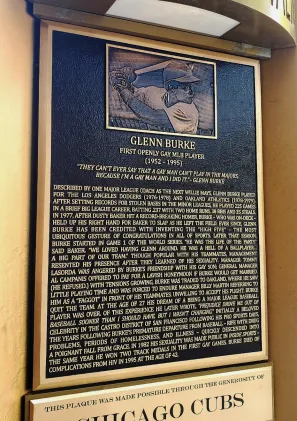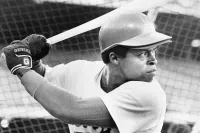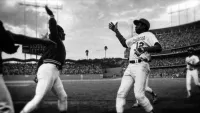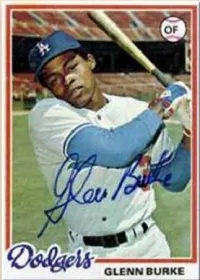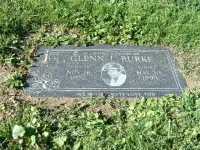Biography
1952 - 1995
“They can’t ever say that a gay man can’t play in the Majors,
because I’m a gay man and I did it.”
- Glenn Burke
Described by one Major League coach as the next Willie Mays, Glenn Burke played for the Los Angeles Dodgers (1976-1978) and Oakland Athletics (1978-1979). After setting records for stolen bases in the minor leagues, he played 225 games in a brief big league career, batting .237 with two home runs, 38 RBIs and 35 steals. In 1977, after Dusty Baker hit a record-breaking homer, Burke – who was on-deck – held up his right hand for Baker to slap as he left the field. Ever since, Glenn Burke has been credited with inventing the “High Five” – the most ubiquitous gesture of congratulations in all of sports. Later that season, Burke started in Game 1 of the World Series. “He was the life of the party” said Baker. “We loved having Glenn around. He was a hell of a ballplayer… a big part of our team.” Though popular with his teammates, management resented his presence after they learned of his sexuality. Manager Tommy Lasorda was angered by Burke’s friendship with his gay son; General Manager Al Campanis offered to pay for a lavish honeymoon if Burke would get married. (He refused.) With tensions growing, Burke was traded to Oakland, where he saw little playing time and was forced to endure manager Billy Martin referring to him as a “faggot” in front of his teammates. Unwilling to accept his plight, Burke quit the team. At the age of 27 his dream of a being a Major League baseball player was over. Of this experience he later wrote, “Prejudice drove me out of baseball sooner than I should have. But I wasn’t changing.” Initially a beloved celebrity in the Castro District of San Francisco following his pro sports days, the years following Burke’s premature departure from baseball – rife with drug problems, periods of homelessness, and illness – quickly descended into a poignant fall from grace. In 1982 his sexuality was made public in Inside Sports – the same year he won two track medals in the first Gay Games. Burke died of complications from HIV in 1995 at the age of 42.
1952 - 1995
“They can’t ever say that a gay man can’t play in the Majors,
because I’m a gay man and I did it.”
- Glenn Burke
Described by one Major League coach as the next Willie Mays, Glenn Burke played for the Los Angeles Dodgers (1976-1978) and Oakland Athletics (1978-1979). After setting records for stolen bases in the minor leagues, he played 225 games in a brief big league career, batting .237 with two home runs, 38 RBIs and 35 steals. In 1977, after Dusty Baker hit a record-breaking homer, Burke – who was on-deck – held up his right hand for Baker to slap as he left the field. Ever since, Glenn Burke has been credited with inventing the “High Five” – the most ubiquitous gesture of congratulations in all of sports. Later that season, Burke started in Game 1 of the World Series. “He was the life of the party” said Baker. “We loved having Glenn around. He was a hell of a ballplayer… a big part of our team.” Though popular with his teammates, management resented his presence after they learned of his sexuality. Manager Tommy Lasorda was angered by Burke’s friendship with his gay son; General Manager Al Campanis offered to pay for a lavish honeymoon if Burke would get married. (He refused.) With tensions growing, Burke was traded to Oakland, where he saw little playing time and was forced to endure manager Billy Martin referring to him as a “faggot” in front of his teammates. Unwilling to accept his plight, Burke quit the team. At the age of 27 his dream of a being a Major League baseball player was over. Of this experience he later wrote, “Prejudice drove me out of baseball sooner than I should have. But I wasn’t changing.” Initially a beloved celebrity in the Castro District of San Francisco following his pro sports days, the years following Burke’s premature departure from baseball – rife with drug problems, periods of homelessness, and illness – quickly descended into a poignant fall from grace. In 1982 his sexuality was made public in Inside Sports – the same year he won two track medals in the first Gay Games. Burke died of complications from HIV in 1995 at the age of 42.
Demography
Demography
Gender Male
Sexual Orientation Gay
Gender Identity Cisgender
Ethnicity African American Black
Nations Affiliated United States
Era/Epoch AIDS Era (1980-present) Information Age (1970-present) Post-Stonewall Era (1974-1980)
Field(s) of Contribution
Athletics
Commemorations & Honors
First Out Active Baseball Player (To His Teammates and Managers)
Credited With Inventing the High-Five (1977)
Won Medals at the First Gay Games in the 100 and 200 Meter Sprints (1982)
Inside Sports Magazine Article Revealed Burke Was Gay to the Public (1982)
Posthumous National Gay and Lesbian Sports Hall of Fame Inductee (2013)
2014 All-Star Game Honored Burke at a Pre-Game Press Conference- Note the Fox Broadcast Failed to Mention His Name (2014)
Oakland Athletics Honored Burke During Their Pride Night With Burke's Brother Sydney Throwing Out the Ceremonial First Pitch (2015)
San Francisco Rainbow Honor Walk Honoree (2018)
Los Angeles Dodgers Honor Burke at Ninth Annual LGBTQ+ Pride Night (2022)
Demography
Gender Male
Sexual Orientation Gay
Gender Identity Cisgender
Ethnicity African American Black
Nations Affiliated United States
Era/Epoch AIDS Era (1980-present) Information Age (1970-present) Post-Stonewall Era (1974-1980)
Field(s) of Contribution
Athletics
Commemorations & Honors
First Out Active Baseball Player (To His Teammates and Managers)
Credited With Inventing the High-Five (1977)
Won Medals at the First Gay Games in the 100 and 200 Meter Sprints (1982)
Inside Sports Magazine Article Revealed Burke Was Gay to the Public (1982)
Posthumous National Gay and Lesbian Sports Hall of Fame Inductee (2013)
2014 All-Star Game Honored Burke at a Pre-Game Press Conference- Note the Fox Broadcast Failed to Mention His Name (2014)
Oakland Athletics Honored Burke During Their Pride Night With Burke's Brother Sydney Throwing Out the Ceremonial First Pitch (2015)
San Francisco Rainbow Honor Walk Honoree (2018)
Los Angeles Dodgers Honor Burke at Ninth Annual LGBTQ+ Pride Night (2022)
Resources
Resources
"And the Band Plays On." Sports Illustrated 82.23 (June 12, 1995): 15.
Bull, Chris. "Safe at Home: After Years in the Closet as a Professional Baseball Player, Billy Bean Finds Happiness as an Openly Gay Man." The Advocate 801 (December 21, 1999): 34-42.
Burke, Glenn, and Erik Sherman. Out at Home: The Glenn Burke Story. New York: Excel Publishing, 1995.
Crowe, Jerry. "When Glory Has Soured: Former Dodger Glenn Burke battles AIDS as He Struggles to Survive Life on the Streets." Los Angeles Times (August 30, 1994): C 1.
Frey, Jennifer. "A Boy of Summer's Long, Chilly Winter: Once a Promising Ballplayer, Glenn Burke Is Dying of AIDS." New York Times (October 18, 1994): B 15.
Light, Jonathan Fraser. "Homosexuals." The Cultural Encyclopedia of Baseball. Jefferson, N. C., and London: McFarland & Company, 1997. 346-347.
Maraniss, Andrew. Singled Out: The True Story of Glenn Burke. New York: Philomel Books, 2021.
"The Outfielder Who Came Out." People Weekly 42. 21 (November 21, 1994): 151.
Smith, Michael J. "The Double Life of a Gay Dodger." Inside Sports (October 1982): 57-63.
Szymcazk, Jerome. "Glenn Burke." Gay & Lesbian Biography. Michael J. Tyrkus, ed. Detroit: St. James Press, 1997. 94-95.
http://articles.latimes.com/2013/aug/21/sports/la-sp-dodgers-glenn-burke-20130822
http://www.npr.org/2013/05/05/181410089/the-price-glenn-burke-paid-for-coming-out
https://calltothepen.com/2020/05/30/forgotten-mlb-player-spotlight-glenn-burke-true-pioneer/
https://www.them.us/story/singled-out-first-openly-gay-man-play-mlb-glenn-burke
https://www.nytimes.com/2022/06/02/sports/baseball/glenn-burke-dodgers-pride.html
Resources
"And the Band Plays On." Sports Illustrated 82.23 (June 12, 1995): 15.
Bull, Chris. "Safe at Home: After Years in the Closet as a Professional Baseball Player, Billy Bean Finds Happiness as an Openly Gay Man." The Advocate 801 (December 21, 1999): 34-42.
Burke, Glenn, and Erik Sherman. Out at Home: The Glenn Burke Story. New York: Excel Publishing, 1995.
Crowe, Jerry. "When Glory Has Soured: Former Dodger Glenn Burke battles AIDS as He Struggles to Survive Life on the Streets." Los Angeles Times (August 30, 1994): C 1.
Frey, Jennifer. "A Boy of Summer's Long, Chilly Winter: Once a Promising Ballplayer, Glenn Burke Is Dying of AIDS." New York Times (October 18, 1994): B 15.
Light, Jonathan Fraser. "Homosexuals." The Cultural Encyclopedia of Baseball. Jefferson, N. C., and London: McFarland & Company, 1997. 346-347.
Maraniss, Andrew. Singled Out: The True Story of Glenn Burke. New York: Philomel Books, 2021.
"The Outfielder Who Came Out." People Weekly 42. 21 (November 21, 1994): 151.
Smith, Michael J. "The Double Life of a Gay Dodger." Inside Sports (October 1982): 57-63.
Szymcazk, Jerome. "Glenn Burke." Gay & Lesbian Biography. Michael J. Tyrkus, ed. Detroit: St. James Press, 1997. 94-95.
http://articles.latimes.com/2013/aug/21/sports/la-sp-dodgers-glenn-burke-20130822
http://www.npr.org/2013/05/05/181410089/the-price-glenn-burke-paid-for-coming-out
https://calltothepen.com/2020/05/30/forgotten-mlb-player-spotlight-glenn-burke-true-pioneer/
https://www.them.us/story/singled-out-first-openly-gay-man-play-mlb-glenn-burke
https://www.nytimes.com/2022/06/02/sports/baseball/glenn-burke-dodgers-pride.html
